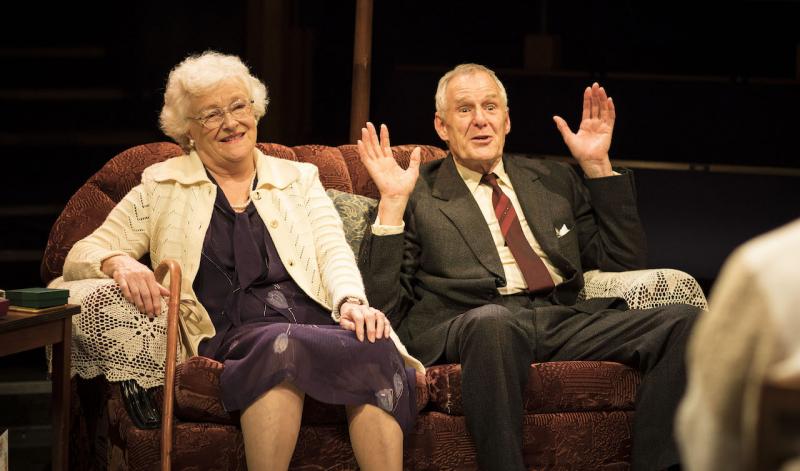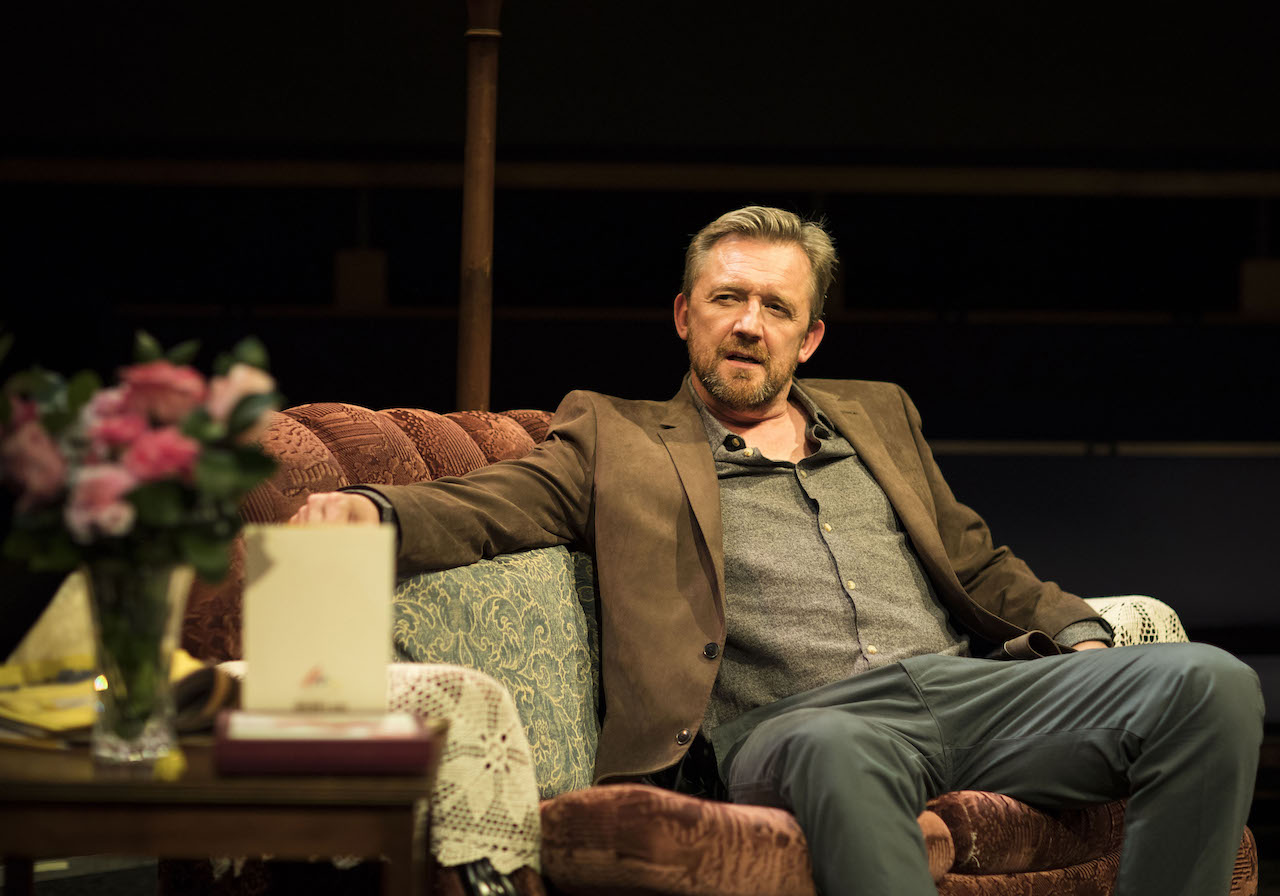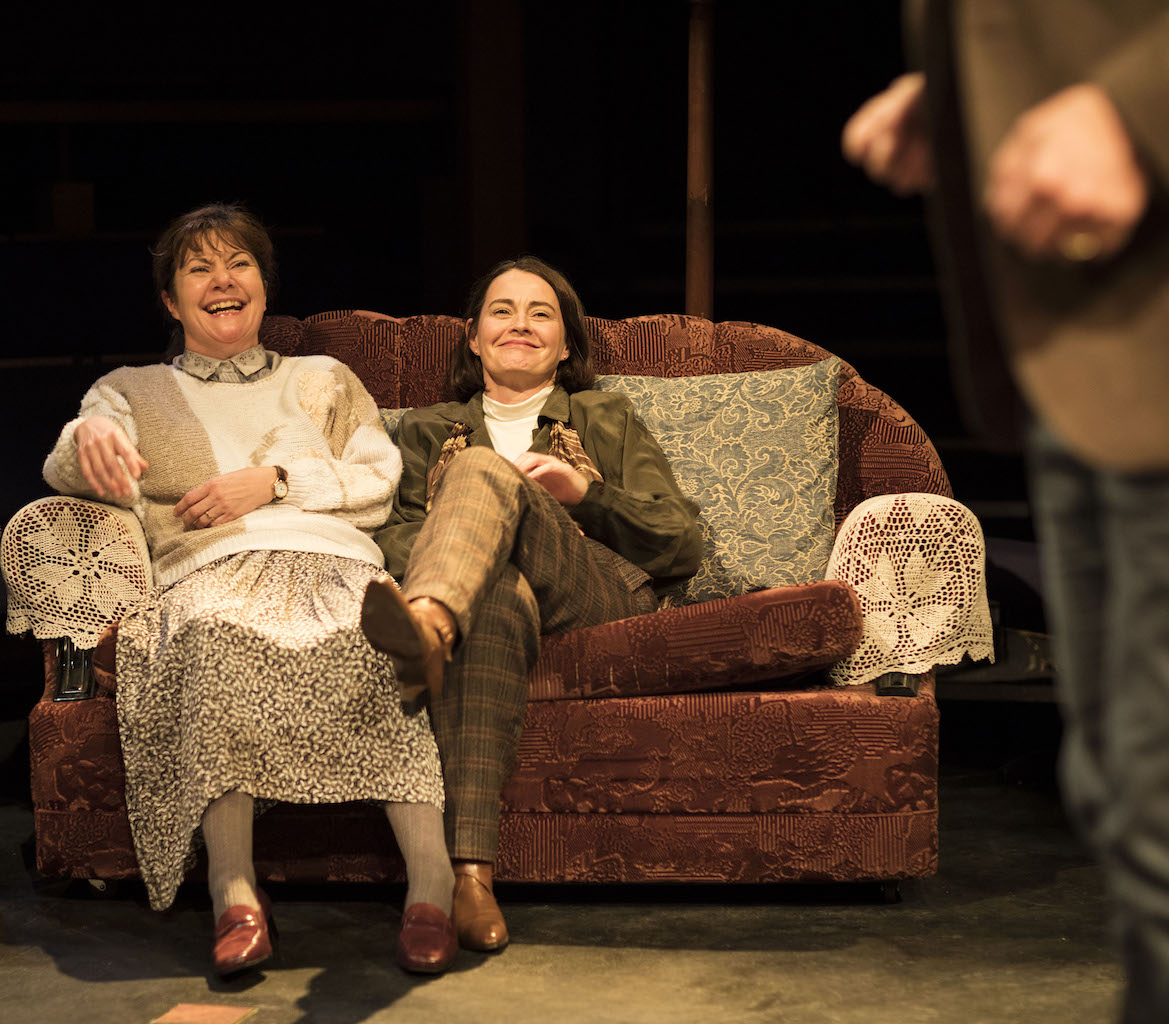The March on Russia, Orange Tree Theatre review – vividly funny amid the bleakness | reviews, news & interviews
The March on Russia, Orange Tree Theatre review – vividly funny amid the bleakness
The March on Russia, Orange Tree Theatre review – vividly funny amid the bleakness
David Storey skilfully probes troubled relations inside a Yorkshire bungalow

The late David Storey spoke movingly, elsewhere on The Arts Desk, of his sense of overwhelming powerlessness at the challenge of accepting his father’s death. “I was quite racked by his death, and what death had become as an abstraction - in other words, what's my death, what's death itself?” he said.
The question that shapes his 1989 play, The March on Russia, is the equally overwhelming prologue to that particular state, what you might call pre-death, the purgatorial existence between the end of your working life and identity and death. In the case of two old people married 60 years, what exactly is there for them, or their three children, to celebrate?
Richmond's tiny Orange Tree Theatre could hardly contrast more with the play’s original venue, the National Theatre, but it is an inspired space for this bungalow drama, and makes a graceful tribute to Storey, who died last March. James Perkins’s design and Alice Hamilton’s alert direction make the size a true asset, cramming the audience in around the Pasmores’ home as if we were actually inside it. The floor is divided into kitchen and living room by an invisible wall – strictly observed by the cast even though it is marked only by some painted floor tiles and a disembodied little coal fire, which is eternally prodded by its proud owner, former miner and World War I veteran Tommy Pasmore. He holds up a piece of coal to admire it, coughing: he spent 45 years underground digging it and its ilk out. Reflecting Storey's own life, son Colin is nothing like the dad – he’s an arty-farty writer who’s gentrified his Yorkshire vowels and once had a panic attack on a plane to New York to launch his book (pictured above, Colin Tierney as Colin). Around this classic father-son axis Storey arranges the female assistants, mother and her two daughters – a good domestic one with kids, and a bad professional one without.
Reflecting Storey's own life, son Colin is nothing like the dad – he’s an arty-farty writer who’s gentrified his Yorkshire vowels and once had a panic attack on a plane to New York to launch his book (pictured above, Colin Tierney as Colin). Around this classic father-son axis Storey arranges the female assistants, mother and her two daughters – a good domestic one with kids, and a bad professional one without.
Mother and Father form a second, trickier axis in the scheme, for their children have only made the effort to visit because of the diamond wedding anniversary. We seem all set to march on large territories, to sound out what time does to love between octogenarians, and between parents and children.
And it’s a good, hard theme, even without the Thatcher-era implications. Can children and parents talk about anything honestly? Does time always make things worse? The unspoken message is that this might be the last time when they will see both parents, yet the formality of the reason for being there is a palpable relief – it dictates the direction of conversations into safe public spaces, like Father reminiscing jauntily about his wartime adventures, Mother about the modesty of their wedding.
But Storey soon shows that the amiable bickerings that got the parents through their early trials have curdled into upsetting ritual fights. Time seems to have stripped the soft tissues of love away from their differences. Boredom, intolerance, spoilers about jokes, oneupmanship over the crossword, have become daily fisticuffs between two old people who can’t enjoy any understanding of their children or today’s world. Where are they headed?
The audience surfs the first half in laughter at some of the Darby and Joan barneys
The March on Russia gives one plenty to feel bleak about, but parts of it are vividly funny. Storey’s character dialogue has such snap and authenticity that the audience surfs the first half in laughter at some of the Darby and Joan barneys. Tea is made and drunk in gargantuan quantities. Mrs Pasmore is a grimly comical monster: she puts her husband down with toe-curling relish – “You were born stupid, you’re still stupid” – and she makes a cruel scene about an anniversary gift.
Hamilton directs a string of awkward situations in her tiny space with ideal timing from her cast, crowned by Ian Gelder’s masterly performance as an immensely likeable, mildly infuriating Tommy Pasmore. Downtrodden and romantic, he still manages to persuade you that he might just have made his epic naval march in Russia in 1918 – even the alarming coalface episode he relates with the drill could fit into this surprise human package. And he wonderfully conjures up a vision of past, if barely believable bliss with the once adorable Mrs P.
Though perhaps Tommy is senile, and that may be why his son is a stranger – the lanky Tierney uses his height well, looming tensely over the little rooms, tight-lipped, almost exploding with his inexpressible wish to belong and his revulsion at what he would belong to.
 Storey gives the womenfolk less emotional dimension. Despite Sue Wallace’s acting skill and sharp delivery, the ironclad mother comes over as more a device to assist the father-son characters than a genuine protagonist in a marriage we want to analyse. The sisters, politician Wendy (Sarah Belcher) and housewife Eileen, also have a good deal of looking on to do, the potentially intriguing Eileen being particularly underwritten (pictured above, Connie Walker and Sarah Walker).
Storey gives the womenfolk less emotional dimension. Despite Sue Wallace’s acting skill and sharp delivery, the ironclad mother comes over as more a device to assist the father-son characters than a genuine protagonist in a marriage we want to analyse. The sisters, politician Wendy (Sarah Belcher) and housewife Eileen, also have a good deal of looking on to do, the potentially intriguing Eileen being particularly underwritten (pictured above, Connie Walker and Sarah Walker).
All five actors look too young for their roles – Storey's play feels not quite fully enough provisioned to march the distance about old age. Still, the coldness of the territory is certainly well marked out in this clever miniature production.
- The March on Russia is at the Orange Tree Theatre, Richmond, till 7 October
- Read more theatre reviews on theartsdesk
rating
Explore topics
Share this article
The future of Arts Journalism
You can stop theartsdesk.com closing!
We urgently need financing to survive. Our fundraising drive has thus far raised £49,000 but we need to reach £100,000 or we will be forced to close. Please contribute here: https://gofund.me/c3f6033d
And if you can forward this information to anyone who might assist, we’d be grateful.

Subscribe to theartsdesk.com
Thank you for continuing to read our work on theartsdesk.com. For unlimited access to every article in its entirety, including our archive of more than 15,000 pieces, we're asking for £5 per month or £40 per year. We feel it's a very good deal, and hope you do too.
To take a subscription now simply click here.
And if you're looking for that extra gift for a friend or family member, why not treat them to a theartsdesk.com gift subscription?
more Theatre
 The Weir, Harold Pinter Theatre review - evasive fantasy, bleak truth and possible community
Three outstanding performances in Conor McPherson’s atmospheric five-hander
The Weir, Harold Pinter Theatre review - evasive fantasy, bleak truth and possible community
Three outstanding performances in Conor McPherson’s atmospheric five-hander
 Dracula, Lyric Hammersmith review - hit-and-miss recasting of the familiar story as feminist diatribe
Morgan Lloyd Malcolm's version puts Mina Harkness centre-stage
Dracula, Lyric Hammersmith review - hit-and-miss recasting of the familiar story as feminist diatribe
Morgan Lloyd Malcolm's version puts Mina Harkness centre-stage
 The Code, Southwark Playhouse Elephant review - superbly cast, resonant play about the price of fame in Hollywood
Tracie Bennett is outstanding as a ribald, riotous Tallulah Bankhead
The Code, Southwark Playhouse Elephant review - superbly cast, resonant play about the price of fame in Hollywood
Tracie Bennett is outstanding as a ribald, riotous Tallulah Bankhead
 Reunion, Kiln Theatre review - a stormy night in every sense
Beautifully acted, but desperately grim drama
Reunion, Kiln Theatre review - a stormy night in every sense
Beautifully acted, but desperately grim drama
 The Lady from the Sea, Bridge Theatre review - flashes of brilliance
Simon Stone refashions Ibsen in his own high-octane image
The Lady from the Sea, Bridge Theatre review - flashes of brilliance
Simon Stone refashions Ibsen in his own high-octane image
 Romans: A Novel, Almeida Theatre review - a uniquely extraordinary work
Alice Birch’s wildly epic family drama is both mind-blowing and exasperating
Romans: A Novel, Almeida Theatre review - a uniquely extraordinary work
Alice Birch’s wildly epic family drama is both mind-blowing and exasperating
 The Producers, Garrick Theatre review - Ve haf vays of making you laugh
You probably know what's coming, but it's such great fun!
The Producers, Garrick Theatre review - Ve haf vays of making you laugh
You probably know what's coming, but it's such great fun!
 Not Your Superwoman, Bush Theatre review - powerful tribute to the plight and perseverance of Black women
Golda Rosheuvel and Letitia Wright excel in a super new play
Not Your Superwoman, Bush Theatre review - powerful tribute to the plight and perseverance of Black women
Golda Rosheuvel and Letitia Wright excel in a super new play
 Cow | Deer, Royal Court review - paradox-rich account of non-human life
Experimental work about nature led by Katie Mitchell is both extraordinary and banal
Cow | Deer, Royal Court review - paradox-rich account of non-human life
Experimental work about nature led by Katie Mitchell is both extraordinary and banal
 Deaf Republic, Royal Court review - beautiful images, shame about the words
Staging of Ukrainian-American Ilya Kaminsky’s anti-war poems is too meta-theatrical
Deaf Republic, Royal Court review - beautiful images, shame about the words
Staging of Ukrainian-American Ilya Kaminsky’s anti-war poems is too meta-theatrical
 Laura Benanti: Nobody Cares, Underbelly Boulevard Soho review - Tony winner makes charming, cheeky London debut
Broadway's acclaimed Cinderella, Louise, and Amalia reaches Soho for a welcome one-night stand
Laura Benanti: Nobody Cares, Underbelly Boulevard Soho review - Tony winner makes charming, cheeky London debut
Broadway's acclaimed Cinderella, Louise, and Amalia reaches Soho for a welcome one-night stand
 The Pitchfork Disney, King's Head Theatre review - blazing with dark energy
Thrilling revival of Philip Ridley’s cult classic confirms its legendary status
The Pitchfork Disney, King's Head Theatre review - blazing with dark energy
Thrilling revival of Philip Ridley’s cult classic confirms its legendary status

Add comment